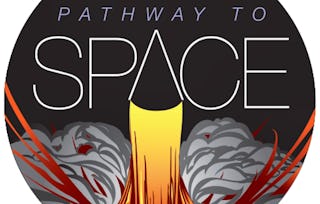Come aboard! If you decide to take this course, you will expand your horizon of what is possible for you in the cosmos. In Course 1 (Our Place in the Cosmos) of this four course specialization, there are 39 learning objectives spread out over 4 weeks and 10 lessons.
Week 1 - You will learn about the course and the specialization as a whole as well as the method used to guide you through the material. You will also get to meet the crew of the USS Pathway to Space. As your instructor and captain, I will create a unique and hopefully fun learning environment full of surprises and moments of connection with the material. We will also discuss how wonder started it all with our first guest, Dr. Valerio Ferme with Space and Wonder. Week 2 - We have two topics and two guests this week. In A Tour of the Cosmos, with Dr. Erica Ellingson, we will guide you through all the grandeur of the cosmos from the size and scale to the timeline of its existence. In Astrophysics, with Dr. Kevin France, we will explore concept and merger of two great fields of study: Astronomy and Physics. The tools used by an astrophysicists are key to unlocking the cosmos. At the end of this week, you will have a better understanding of the cosmos and your place in it. Week 3 - Space exploration can happen in two ways. By viewing there and going there. This week we will explore both methods. Our first lesson is with Dr. Paul Hayne and Dr. Carolyn Crow on Space Exploration-Going There. We will look at the stages of exploration and how the science changes at each point. Next, we will meet Dr. Kristy Tiampo as we discuss Space Exploration-Viewing There. We will dive deep into remote sensing work around Earth and how that technique of viewing can be applied throughout the cosmos. Week 4 - This week, we will discuss some of the great science being conducted in the cosmos as well as our species search life elsewhere in the universe. We have three lessons this week. The first two are in two parts. Extending Science Beyond Earth. In Part 1, we meet Dr. Nick Schneider and discuss how the different wavelengths of light have allowed us to understand other planets like Mars but also Earth. In Part 2, we meet Dr. Dave Brain and discuss what we have learned about other planets in our solar system and compare those discoveries with our home planet. We will end with the Search for Life Elsewhere where our guest, Dr. Bruce Jakosky, and I discuss what is needed for life in the cosmos and where we might find it. In these lessons, you will become a member of the crew of the USS Pathway to Space and together we will make the unknown, known. Your journey to discovering your pathway to space begins now.


















